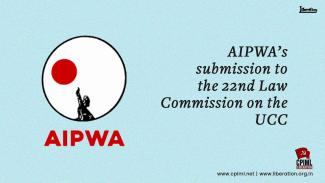AIPWA acknowledges that the Personal Laws across religions contain provisions that are discriminatory towards women and violate the fundamental tenet of equality guaranteed by the Constitution. However, the belief that a "Uniform Civil Code" is an answer, is not true. It is known that the root cause of inequality lies in discrimination and not in difference. Any attempt to amend personal laws must address the inequality, to ensure the Constitutional guarantee of equality, rather than imposing uniformity. What is required is law reform and institutional reform that will lead to gender justice.
Till date, various laws such as the Protection of Women from Domestic Violence Act, 2005, the Prohibition of Child Marriage Act, 2006 and the Medical Termination of Pregnancy Act, 1971 have been brought in which are universally applicable to women from all communities.
Women’s work should be recognised and given due social dignity. Women are working and contributing to the family and society in many ways, and it is high time the State recognizes the unpaid contributions of women in their families, The State should also enact laws in areas of matrimonial property in which no personal laws exist and ensure women's rights to the property and assets in the natal and as well as in the matrimonial home. Also, personal laws of all religions regarding marriage, custody, maintenance, and inheritance and in secular laws, must eliminate the disadvantage faced by women. The Constitutional privileges and protections given to Adivasis and constitutional limits (Articles 371A to 3711) regarding the customary laws and practices of Scheduled Tribes particularly in the Northeastern states must be protected.
We are all for legal reforms to ensure equality and gender justice in all communities and regions, and we strongly oppose any move to disregard the cultural diversity of India in the name of imposing any uniformity on all. The idea should be to ensure equality and reconcile it with diversity and not pit one against the other.











